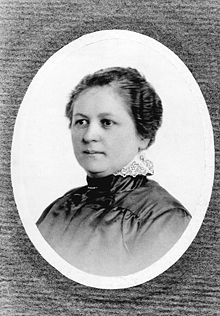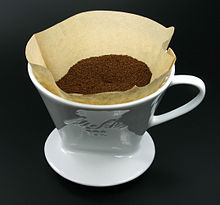Melitta Bentz
Bentz, Melitta | |
|---|---|
 | |
| Born | 31 January 1873 |
| Died | 29 June 1950 (aged 77) |
| Occupation | Entrepreneur |
| Spouse | Hugo Bentz |
| Children | 2 |

Amalie Auguste Melitta Bentz (31 January 1873 – 29 June 1950), born Amalie Auguste Melitta Liebscher, was a German entrepreneur who invented the paper coffee filter brewing system in 1908. She founded the namesake company Melitta, which still operates under family control.
Early life
Melitta Bentz was born in Dresden, Germany, on January 31, 1873.[1] She was born by the name Amalie Auguste Melitta Liebscher, and her parents were Karl and Brigitte Liebscher.[2] She was born into a family of successful businessmen and entrepreneurs, her father was a publisher while her grandparents founded and owned a brewery.[3] She married Johannes Emil Hugo Bentz, who was a small business owner in either 1898 or 1899, and the couple had three children, including two sons: Willy in 1899 and Horst in 1904; and one daughter by the name of Herta in 1911.[3]
Biography
Melitta Bentz was born Amalie Auguste Melitta Liebscher to Karl and Brigitte Leibscher on January 31, 1873 in Dresden, Germany.[4] Her grandparents owned a brewery and her father was a book salesman and publisher.[5]
As a housewife, Bentz found that percolators were prone to over-brewing the coffee, espresso-type machines at the time tended to leave grounds in the drink, and linen bag filters were tiresome to clean. She experimented with many means but ended up using blotting paper from her son Willy's school exercise book and a brass pot punctured using a nail. When the free, less bitter coffee was met with general enthusiasm, she decided to set up a business.[6][7]
The Kaiserliche Patentamt (Imperial Patent Office) granted her a patent on 20 June 1908, and on 15 December the company was entered into the commercial register with a starting capital of 73 pfennig as "M. Bentz".
Her husband Hugo and their sons Horst and Willy were the first employees of the new company. Together, the family worked out of their home to assemble, package, and sell the filters. The business became an early success, and after contracting a tinsmith to manufacture the devices, they sold 1,200 coffee filters at the 1909 Leipzig fair.[8] In 1910, the company won a gold medal at the International Health Exhibition and a silver medal at the Saxon Innkeepers' Association. When the First World War erupted, metals were requisitioned for use in Zeppelin construction, her husband was conscripted to Romania, paper was rationed, and coffee beans were impossible to import due to the British blockade, disrupting normal business. During the war Bentz ran the company entirely by herself, but was forced to support herself by selling cartons when filter production became impossible.[6][9]
Continuing expansion caused the company to move several times within Dresden. By 1928, the demand for their products was so high that the 80 workers had to work in a double-shift system. As no satisfactory production facilities could be found in Dresden, the fast-growing company moved in 1929 to Minden in eastern Westphalia, where it has been located ever since.[6] By that time 169,420 filters had been produced.[9] While her initial coffee filter design made massive waves in the coffee world, Bentz also worked on a number of improvements to the design, including the now-popular "fast-drip" filter which can be recognized by its conical design.[9]
Horst took over the company, now "Bentz & Sohn", in 1930. Bentz transferred the majority stake in Melitta-Werke Aktiengesellschaft to Horst and Willy in 1932, but kept a hand in the business, ensuring that the employees were cared for, offering Christmas bonuses, increasing vacation days from six to 15 days per year, and reducing the working week to five days. She fostered the company's "Melitta Aid" system, a social fund for company employees.[9]
After the outbreak of World War II, production stopped and the company was ordered to produce goods to aid the war effort. At the end of the war, the workers relocated for a time to old factories, barracks, even pubs, because the surviving portions of the main factory had been requisitioned as a provisional administration for the Allied troops, a condition that held for 12 years. By 1948, production of filters and paper had resumed, and at the time of her death at Holzhausen at Porta Westfalica in 1950, the company valuation had reached 4.7 million Deutsche Marks.[9]
Pain point and innovation
Melitta Bentz started her day by making a cup of coffee as countless others do, but the task regularly annoyed her due to the excess coffee grounds that lingered in the cup of coffee after making it, not only would it affect the taste of the coffee it would also be a hassle to clean afterward due to the grounds getting on the sides of the pot.[2] Her family also was not able to afford the normalized filter of the time (cloth coffee filters) which added to the issue.[10] After having to deal with this problem consistently she began experimenting and she finally found a solution to her problem when she used nails to make holes in her brass pot and then took a clean sheet of paper from her son Willy's notebook and put the sheet over the holes she had made in her brass pot.[10] Then she added coffee grounds and poured boiling water over it and only the beverage filled the cup, which resulted in a cheap, disposable, tastier, and easy to clean coffee filter.[10] She tested her innovation by sharing it with friends to which she received positive feedback and her filter quickly became the preferred filter choice for their coffee brewing needs. Bentz was granted a patent for her innovation in June 1908 by the Imperial Patent Office in Berlin, and shortly after, Bentz would officially start her business named, M. Bentz by entering it into the commercial register.[3]
Legacy
100 years after her invention, the grandchildren of Bentz, Thomas and Stephen Bentz, still handle the Melitta Group KG headquartered in Minden, on the east of North Rhine-Westphalia, with 3,400 employees in 50 countries.[9] Today, the company sells a wide variety of coffee related products, including filters derived from Bentz's original invention.[11]
See also
References
- ^ Hollingsworth, McKenna. "Boigraphy [sic]". Retrieved 21 April 2022.
- ^ a b Moses, C (5 September 2018). "Overlooked no more: Melitta Bentz, who invented the Coffee Filter". The New York Times. Retrieved 21 April 2022.
- ^ a b c "Melitta Bentz - Coffee Filter Inventor and Entrepreneur". A WOMAN'S BRIDGE. 1 January 2017. Retrieved 21 April 2022.
- ^ Moses, Claire (September 5, 2018). "Overlooked No More: Melitta Bentz, Who Invented the Coffee Filter". New York Times. Retrieved March 6, 2021.
{{cite web}}: CS1 maint: url-status (link) - ^ Kumar, Lisa (2017). "Encyclopedia of World Biography". Gale. Retrieved April 6, 2021.
{{cite web}}: CS1 maint: url-status (link) - ^ a b c Moses, Claire (5 September 2018). "Overlooked No More: Melitta Bentz, Who Invented the Coffee Filter". The New York Times. Archived from the original on 30 October 2018. Retrieved 6 December 2018.
- ^ "100 Years of Melitta / Our Brands – Your Trust". 100 Years of Melitta. Melitta. 2008. Archived from the original on 1 October 2008. Retrieved 31 March 2020.
- ^ Stanley, Autumn (1993). Mothers and Daughters of Invention: Notes for a Revised History of Technology. New Brunswick, N.J.: Rutgers University Press. p. 56. ISBN 9780813521978. OCLC 229208630. Retrieved 6 December 2018 – via Google Books.
- ^ a b c d e f "Of Coffee and Filters" (PDF). Melitta. 2005. Archived from the original (PDF) on 11 June 2007.
- ^ a b c "How One Woman Used Her Son's Notebook Paper to Invent Coffee Filters". FOOD & Wine.
- ^ Melitta. "Melitta® - Sustainability". Melitta USA. Retrieved 2022-04-20.
